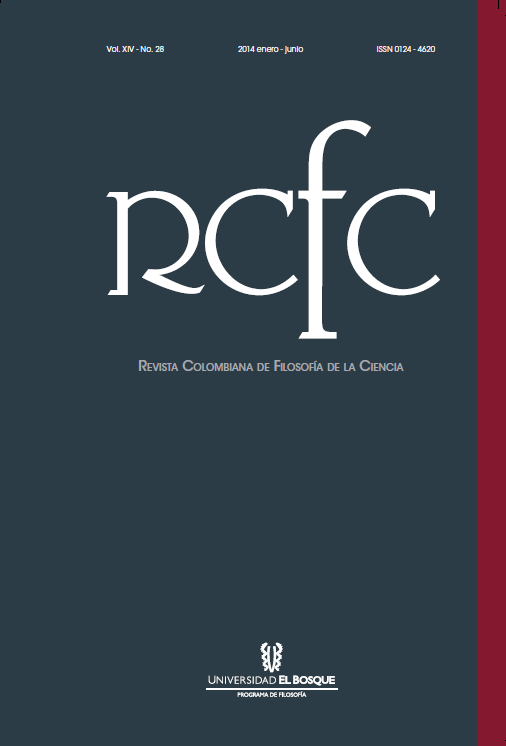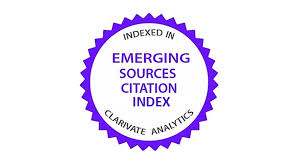Verdad, prueba y papel tornasol
DOI:
https://doi.org/10.18270/rcfc.v14i28.670Resumen
En el presente artículo se analiza la cuestión de si la verdad matemática o, en general, la
verdad en las ciencias formales puede identificarse con la prueba que permite la aseveración
de contenidos en estas ciencias. La respuesta que se defiende es negativa, y se
argumenta explicitando el significado de la noción de verdad de acuerdo con la teoría
prooracional. Las oraciones en las que ocurren términos veritativos como “verdad” o
“verdadero” funcionan como variables proposicionales complejas del lenguaje natural.
A estas oraciones las llamamos prooraciones. Los actos de habla en los que las prooraciones
ocurren carecen de contenido en aislamiento y solo lo adquieren por referencia
anafórica o catafórica a un acto de habla asertivo realizado con éxito. En el artículo se
distingue entre los criterios que dan derecho para aseverar un contenido matemático y el
significado de la noción de verdad aplicada a un contenido matemático. La prueba es un
criterio de aseveración, uno entre otros como asumen filósofos como Putnam o Maddy.
El significado de la noción de verdad es independiente de los criterios y se mantiene
estable en todos sus usos.
Descargas
Referencias bibliográficas
Benacerraf, P. “Mathematical truth”. The Journal of Philosophy 7.19 (1973):
-679.
Carston, R. Thoughts and Utterances. The Pragmatics of Explicit Communication.
Oxford: Blackwell, 2002.
Frápolli, M. J. “Relativism of truth vs. dogmatism about truths. A false dichotomy”.
Teorema XXVIII.3 (2009).
—. The Nature of Truth. An Updated Approach to the Meaning of Truth Adscriptions.
Springer, 2012.
—. “How to naturalize truth”. Regarding Mind, Naturally: Naturalist
Approaches to the Sciences of the Mental. Eds. Marcin Milkowski y K.
Talmont-Kaminski. Cambridge Scholars Publishing, 2013. 262-281.
—. “No miracles. What does it mean that science seeks the truth?” (en prensa).
Frápolli, M. J. & N. Villanueva. “Frege, Sellars, Brandom: expresivismo e
inferencialismo semánticos”. Perspectivas en la filosofía del lenguaje. Comp.
David Pérez Chico. Prensas de la Universidad de Zaragoza, 2013. 583-617.
Frege, G. Posthumous Writings. Oxford: Basil Blackwell, 1979.
Grover Grover, D. A Prosentential Ttheory of Truth. Princeton University
Press, 1992.
Grover, D. L, J. L. Camp & N. Belnap. “A prosentential theory of truth”.
Philosophical Studies 27 (1975): 73-125.
Haack, S. “The unitiy of truth and the plirality of truths”. 2003. Putting
Philosophy to work. Inquiry and its place in culture. Essays on science, religión,
law, literatura, and life. Amherts, NY: Prometheus Book, 2008. 43-60.
Kaplan, D. “Demonstratives”. 1979. Themes from Kaplan. Eds. Joseph Almong,
Howard Wettstein y John Perry. New York: Oxford University Press, 1989.
Maddy, P. “Believing the axioms I”. The Journal of Symbolic Logic 53.2 (1988):
-511.
Musgrave, A. “The miracle argument for scientific realism”. The Rutherford
Journal. (2007). En línea.
Putnam, H. “What is mathematical truth?”. Mathematics, Matter and Method.
Philosophical Papers 1. Cambridge University Press, 1975. 60-78.
Quine, W. v, O. “Truth by convention”. 1939. Philosophy of Mathematics.
Selected Readings. Eds. P. Benacerraf y H.Putnam. Cambridge University
Press, 1964.
Ramsey, F. P. “La naturaleza de la verdad”. 1927. Frank Plumpton Ramsey.
Obra filosófica completa. Ed. M.J. Frápolli. Granada: Editorial Comares,
318-335.
Read, S. (2010): “Necessary proof and truth”. Kriterion jun. 2012: 47-67.
Recanati, F. Truth Conditional Pragmatics. Oxford University Press, 2010.
Schlick, M. (1930/1959) “El viraje de la filosofía”. A. J. Ayer. El positivismo
lógico. México, D. F.: Fondo de Cultura Económica. Edición original:
Logical Positivism, Chicago: The Free Press of Glencoe, 1959.
Searle, J. Actos de habla. Madrid: Cátedra, 1980. Edición original de 1969,
Speech Acts. An Essay in the Philosophy of Language. Cambridge: University
Press.
Stojanovic, I. What is Said: An Inquiry into Reference, Meaning and Content.
VDM Verlag Dr. Müller, 2008.
Tarski, A. “The concept of truth in formalized languages”. 1935. Logic, Semantics,
Metamathematics. Papers from 1923 to 1938. Oxford: Clarendon Press,
152-278.
—. “Truth and Proof”. 1969. Alfred Tarski. Collected Papers 4, 1958-1979.
Eds. R. Givant y E. N. McKenzie Birkäuser. Basel, Boston, Stuttgart,
401-423.
Williams, C.J.F. What is Truth? Cambridge: Cambridge University Press,
—. Being, Identity and Truth. Oxford: Clarendon Press, 1992.
—. “The prosentential theory of truth”. Reports on Philosophy 15 (1995):
-154.
Williams, M. Problems of Knowledge. A Critical Introduction to Epistemology.
Oxford University Press, 2001.











